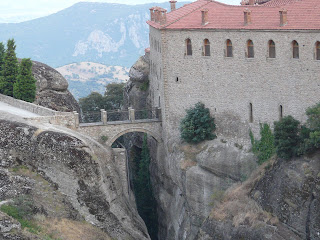There was lots to like in Greece. The weather (except for the Meltemi winds when trying to sail) was consistently good, with highs in the 80's and bright blue skies. We didn't spend a whole lot of time on the beaches, but they're great, and the water temperature was perfect. Greece is a gorgeous country with mountains and coastline and plains. There are ruins and history everywhere - from the ruins at the Acropolis to the more recent (and still functioning) monasteries at Meteora, and it's hard not to be gobsmacked by it all at times.
Unlike some other countries I've visited (Croatia and the BVI come to mind) people are open and friendly and genuinely helpful (unless they're behind the wheel of a car), and don't seem to mind having their countries invaded by hordes of sometimes ignorant and boorish tourists. Take Angelo, our host in Meteora, for example. He spends the tourist season in Meteora, and then closes up his hotel so he can spend the other half of the year in Australia. He was a jovial host, speaking a barely intelligible, heavily Greek-accented version of Australian English. When we left, he gave me something I'd never had before - a big hug with a kiss on each cheek.
Dimitri and Isabella hosted us at hurricane haven in Naxos. They didn't speak a word of English between them, and yet they managed to look after our needs for a day and a half. As well as having a decent meal of barbequed lamb, I bought a liter of his home-brewed wine and a half pound of his homemade goat cheese. I enjoyed it all. Isabella is a raven-haired beauty with a lovely smile (why don't I have any pictures of her?)
Mike was our host in Paros. We stayed at his place when we got to Paros, and when we stayed there again after returning the boat, he greeted us like a favorite uncle, and gave us a big studio room with a balcony. If we're ever in Paros again, we'll certainly stay with him.
As well as lots to like about Greece, there were certainly annoyances as well. Athens and Pireaus are dirty grimy industrial cities without much charm. Graffiti is everywhere, and there doesn't appear to be any effort to clean it up. Particularly annoying were the defaced road signs. It can be tough enough to figure where you're going in a strange country without having to strain to read behind the spray paint. We had a rented car for several days, and generally speaking the roads were decent and in spite of the graffiti, we didn't have too much trouble navigating. What annoyed me most were the tailgating Greeks. Even when trying to pass a string of trucks with our under-powered Hyundai, the locals wouldn't give me a break. They'd stay about a foot off our bumper until we managed to get back into the slower lane. They did the same thing on winding mountain roads. I pulled over literally dozens of times to let the tailgaters pass on by. I thought that doing it Greek-style referred to a certain sexual practice, but I can see that it also refers to a driving style prevalent in the country.
Another thing that annoyed me was the fact that everywhere we went, you couldn't flush the toilet paper down the bowl. Greece is supposed to be a cradle of civilization, but there is something uncivilized about putting a piece of soiled toilet paper in the waste basket.
And in spite of the fact that food appears to be a huge part of Greek life, the food (at least in the tavernas) really sucked. Every menu seemed to be the same with souvlaki, moussaka, a pasta dish or two, and some octopus or calamari. They are all good dishes in their own right, but somehow they seemed stale and lifeless in the typical taverna. I did consistently like the Greek salads. The tomatoes seemed redder and juicier and more luscious than anything I've had here in a long time. I also liked a lot of the local cheeses.
As is usual on a trip like this, with all the downtime in airports and airplanes (and don't forget the day and a half in hurricane haven), I managed to read four books. I read a great one, a terrible one, and two so-so ones. The great one is River of Doubt, by Candice Milliard. This is the harrowing story of a trip that Teddy Roosevelt made in 1913 down a previously uncharted river in the Amazon basin after his failed bid for a third presidential term in 1912. It's a great adventure story about a fascinating man.
The two so-so books are 13 Things That Don't Make Sense, by Michael Brooks, and Confessions of an Economic Hit Man, by John Perkins. 13 Things is one of those geeky science books I normally like about unexplained scientific mysteries like dark matter and energy, but he gets off the rails when he includes free will and homeopathy on his list. Confessions could be an OK book, but the author is way too self-absorbed about his guilt and role in the excesses of globalization and American imperialism. He addresses some very real issues, but he made it sound as if it was all about him.
The absolutely execrable book is Red Herring, by Clyde Ford. I bought this book as a favor to the author at a bookstore in Bellingham. Just as I'm a sucker for panhandlers who are playing an instrument on the street, I was a sucker for a local writer trying to peddle his book. I think this guy bought the book-writing equivalent of a paint-by-number kit for writing mystery novels. I thought I'd like it because it's set in the northwest with a boating theme, but the literary bits and pieces don't come together any more coherently than the little blobs of paint on the numbered spaces. The only reason I finished it was bored desperation until Megan finished River of Doubt.































